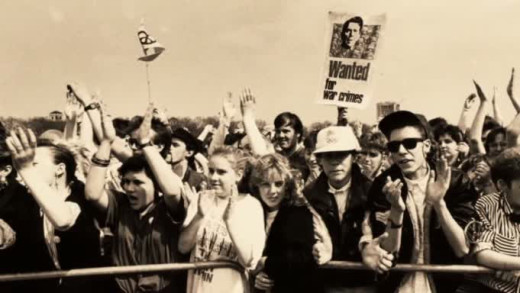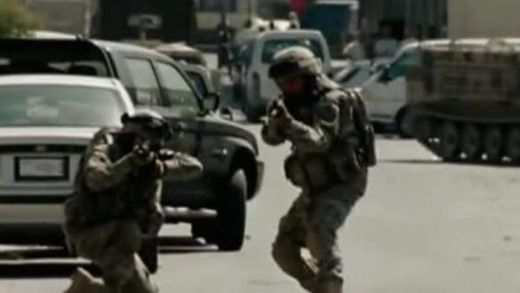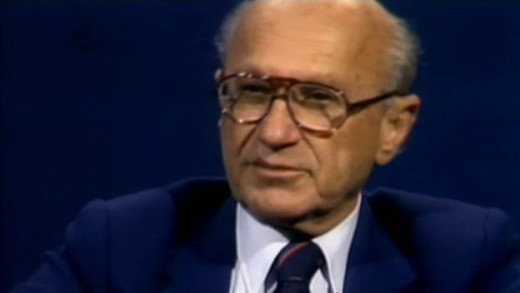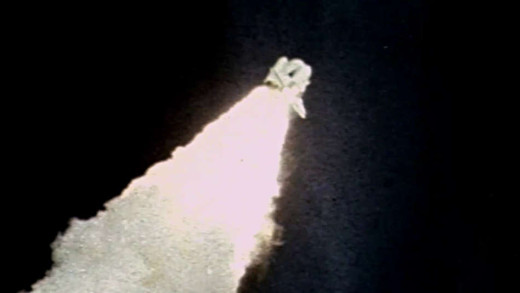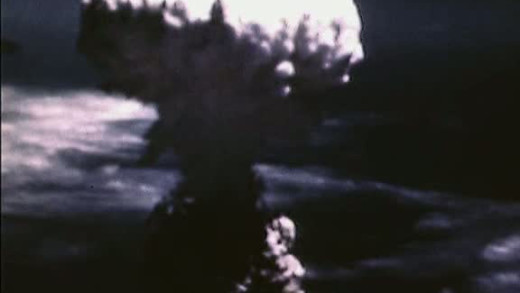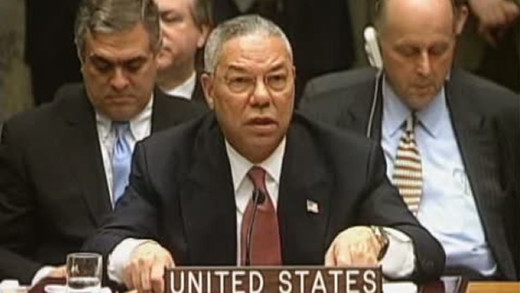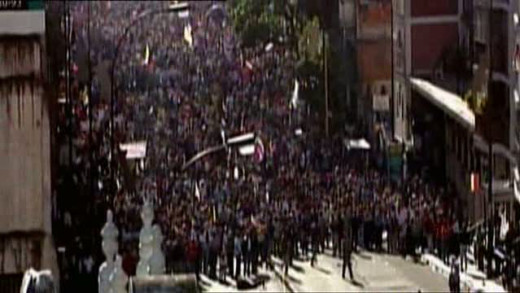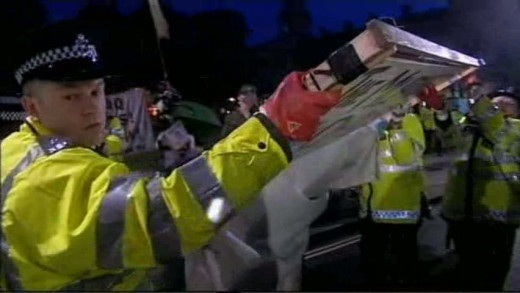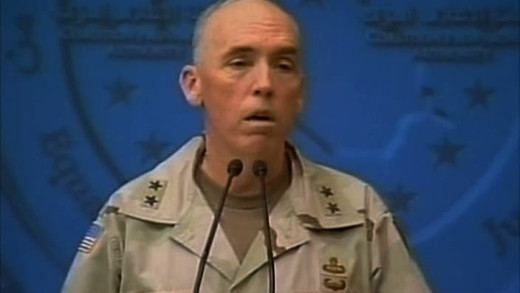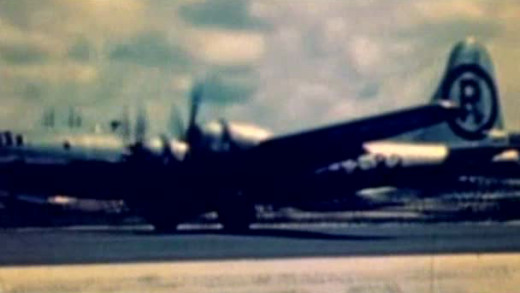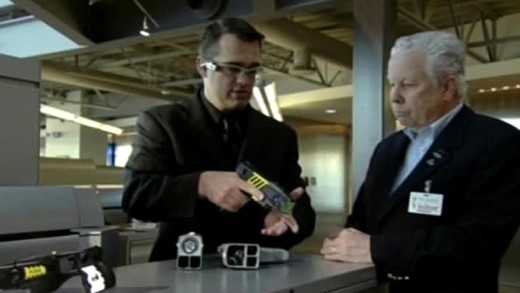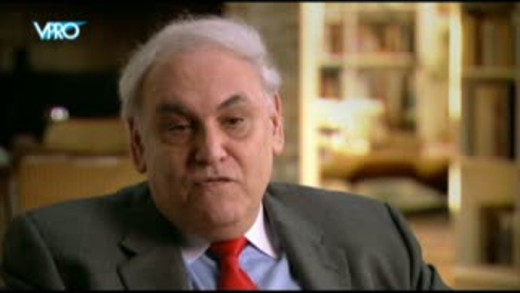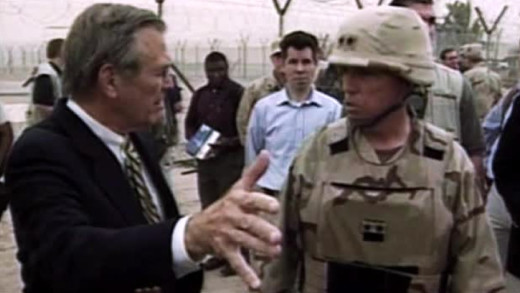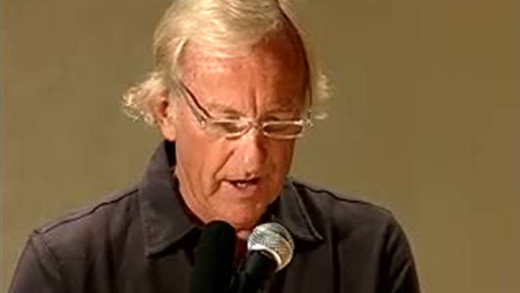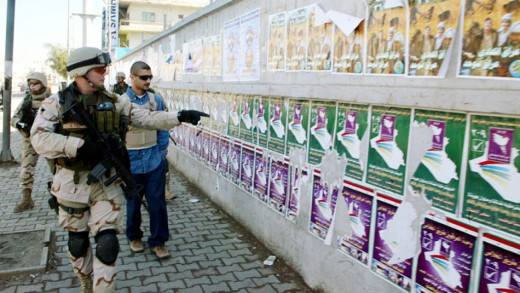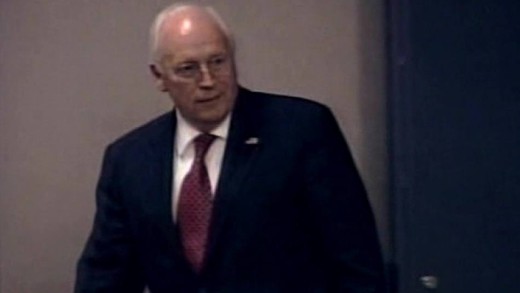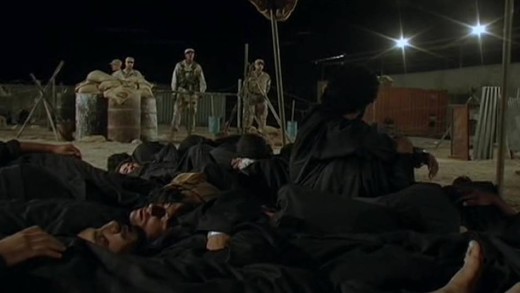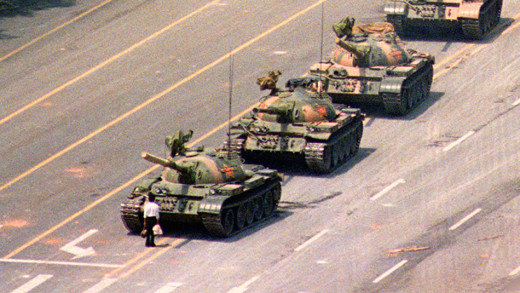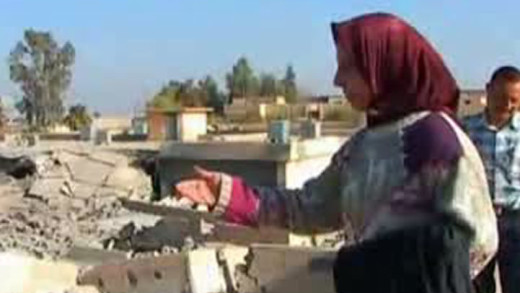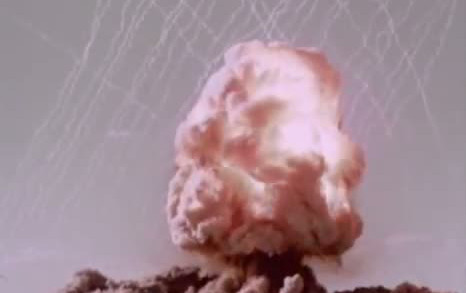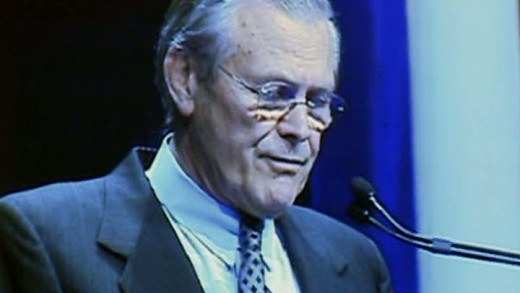By charting the history of the anti-war movement against the political backdrop of the atomic age, Beating The Bomb examines the current state of 'nuclear deterrence' brought about by the nuclear age stemming from the end of World War II, when the United States nuked Hiroshima and Nagasaki. Specifically, the anti-nuclear movement and the founding of the Campaign for Nuclear Disarmament in 1958 amongst others, fight for and end to the British Nuclear Weapons program, which from its inception, was closely tied to The Manhattan Project and still is to this day...
War is hell, but for Hollywood it has been a god-send, providing the perfect dramatic setting against which courageous heroes win the hearts and minds of the movie going public. The Pentagon recognises the power of these celluloid dreams and encourages Hollywood to create heroic myths; to rewrite history to suit its own strategy and as a recruiting tool to provide a steady flow of willing young patriots for its wars...
The Guantanamo detention camp, "Gitmo", covers forty five square miles of Cuba inside an area under a "permanent lease" to the United States. Since 2002, the base has become synonymous with its detainment of "suspected terrorists". Although Barack Obama has given orders for the detention camp to be closed, the facilities remain open to this day. David Miller's quiet, powerful film is the result of three days the film-maker spent touring the camps in May 2008 as part of a small group of media representatives allowed there. Although the event was presented as a chance to 'see inside' the working of Guantanamo, it was in fact a carefully staged PR exercise designed to yield predictable, stale and controlled media images...
By comparing the confluence of ideas about modifying behaviour using shock therapy and other forms of sensory deprivation (which culminated in the top-secret CIA project called MKULTRA during the 1950s) alongside the metaphor of similar shock treatment modifying national economics using the teachings of Milton Friedman and the Chicago School of economics, The Shock Doctrine presents the workings of global capitalism in this framework of how the United States, along with other western countries, has exploited natural and human-engineered disasters across the globe to push through reforms and set-up other mechanisms that suit those in power and 'shock' other countries into a certain wanted behaviour. Chronologically, some historical examples are the using of Pinochet's Chile, Argentina and its junta, Yeltsin's Russia, and the invasion of Iraq. A trumped-up villain always provides distraction or rationalisation for the intervention of the United States—for example, the threat of Marxism, the Falklands, nuclear weapons, or terrorists—and further, is used by those in power as more justification for the great shift of money and power from the many into the hands of the few(er).
Pax Americana and the Weaponization of Space takes us to the Cold War and beyond, where an arms race of weapons technology plays out by the world's superpowers in space. Satellites, nuclear weapons, tracking technologies, rockets--the weaponisation of space was and is more of the same colonialism in the tradition of empire, much like the sea battles of the 18th and 19th centuries. Indeed, as we learn through Operation Paperclip, the United States recruited than 1,600 scientists from Nazi Germany for work in the Space Race after the end of World War II. Fast forward to today, in the name of protecting commercial investment, the United States has crowned itself with being the so-called "arbiter of peace" in space. But with their weapons industry replacing almost all other manufacturing in America, this claim is ludicrous. More than fifty cents of every US tax dollar is spent on the military. The dream of the original Dr. Strangelove, Wernher von Braun--the Nazi rocket-scientist turned NASA director--has survived every US administration since World War II and is coming to life ever more rapidly. Today, space is largely weaponised, a massive military-industrial-complex thrives, and many nations are manoeuvring for advantage with yet more weapons of war, surveillance, and control.
In 1990, alarming evidence of NATO-sponsored terrorist attacks came to light. NATO’s secret "stay behind" armies that were set up across Western Europe after the Second World War were supposedly intended to help put together a resistance if the Soviet Union invaded. However, they went on to commit terrorist attacks against their own populations, so as to influence domestic politics. The forces still exist post-Cold War. This film is the shocking story of Operation Gladio--a tale of espionage, conspiracy and political violence carried out by the United States.
More than three million Vietnamese people still suffer the gruelling effects of chemical weapons used by the United States during the Vietnam War. American militaries doused forests, lands and waterways of Vietnam with the deadly chemicals Agent Orange, White, Blue, Pink, Green and Purple. Agent Orange in particular, which contains dioxin—the most toxic chemical ever known—has disabled countless people and generations of their offspring. This film weaves personal stories together with the stories of American GIs to lead to a great unravelling of the first-hand devastating and lethal effects of Agent Orange and war, generations later.
On 8th August 1945, the United States dropped its second atomic bomb on Nagasaki, Japan, three days after the bombing of Hiroshima. The city was a veritable apocalyptic vision, devastated by this new type of weapon. Nagasaki -- The Horror Of Fat Man documents the memories of survivors, both Japanese civilians and Western Prisoners Of War, as they relate the morbid aftermath of the bombings, the United States occupation, and the segregation that still effects fallout victims to this day.
By risking torture and life in jail, courageous young citizens of Burma live the essence of journalism as they document the uprisings against the military regime in 2007. Armed with small handycams, the Burma VJs stop at nothing to make their reports from the streets of Rangoon. Their video footage is smuggled out of the country and broadcast back in via satellite and offered up for use in the international media. The whole world witnesses single event clips made by the VJs, but for the very first time, the individual images have been put together here to tell a much bigger story...
In 2004, during the invasion of Iraq, the public learned of systemic sexual abuse, torture, rape and even murder going on inside Abu Ghraib prison in Baghdad. Photographs taken by the soldiers themselves were at the centre of the scandal, and seared public consciousness. Standard Operating Procedure sets out to examine the context of these photographs. Why were they taken? What was happening outside the frame? The Abu Ghraib photographs serve as both an expose and a coverup. An expose, because the photographs offer us a glimpse of the horror of Abu Ghraib; and a coverup because they convinced journalists and readers they had seen everything, that there was no need to look further...
Reaching into the Orwellian memory hole, War Made Easy exposes the some 50-year pattern of government deception and media spin that has dragged the United States into one war after another from Vietnam to Iraq. Using archival footage of official distortion and exaggeration from LBJ to George Bush, this film reveals how the American news media have uncritically disseminated the pro-war messages of successive governments -- paying special attention to the parallels between the Vietnam war and the war in Iraq...
Set in Latin America and the US, War on Democracy explores the historic and current relationship of Washington with countries such as Venezuela, Bolivia and Chile. John Pilger examines the role of Washington in America's manipulation of Latin America during the last 50 years leading up to the struggle by ordinary people to free themselves from poverty and racism...
This documentary looks at the erosion of civil liberties and increase in government surveillance since 1997 in the UK with the advent of "New Labour" and Tony Blair. Modern politicians, regardless of left or right, always seem to promise hope and change, but what is delivered is more of the same. To illustrate this, the film tracks 6 key areas that have been rapidly dismantled in so-called democracies over the last few decades: Freedom of speech; the right to assemble and protest; the presumption of innocence; the right to privacy; detention without charge, the prohibition on torture...
Taxi To The Dark Side examines America's policy on torture and interrogation in general, specifically the CIA's use of torture and their research into sensory deprivation. There is description of the opposition to the use of torture from its political and military opponents, as well as the defence of such methods; the attempts by Congress to uphold the standards of the Geneva Convention forbidding torture; and the popularisation of the use of torture techniques in American television shows...
60 years after the United States dropped nuclear weapons on Hiroshima and Nagasaki in Japan, the events are still espoused with denial and myth in histories taught by the west. White Light, Black Rain breaks this acquiescence and accounts the bombings from the point of view of the people who were there, speaking with survivors of the attacks and four American military men that were intimately involved in dropping the bombs. The film intimately details the human costs of warfare and stands as a powerful warning that with enough present-day nuclear weapons worldwide to equal 400,000 Hiroshimas, we cannot afford to forget what really happened with these events.
What if you live in the most destructive culture ever to exist? What if that culture refuses to change? What do you do about it? Derrick Jensen, the author of Endgame responds to these imperative questions and details how industrial civilisation and the persistent and widespread violence it requires is ultimately unsustainable—and what to do about it. Jensen weaves together history, philosophy, environmentalism, economics, literature and psychology to produce a powerful argument that demands attention...
The Invisible War documents the rapid militarisation of police in recent years by looking at the deployment of so-called 'non-lethal' weapons and the real effects of their use. Shotguns loaded with bean bags, rubber bullets, wood, rubber, and foam cylinders; electrical tasers; pepper sprays, OC-gas, and other chemical weapons; microwaves, stink bombs, pulsed energy weapons and many more. What is interesting is that, according to an overwhelming amount of recorded cases, these weapons have turned out to have caused many deaths and/or serious injuries, and are more often used on peaceful non-compliant citizens, or protesters, as a means of obedience rather than protection—invoking serious questions about the future of police and society.
For many years now the American foreign policy has been characterized by the strong tie between the United States and Israel. Does the United States in fact keep Israel on its feet? And how long will it continue to do so?
Ghosts of Abu Ghraib examines the sexual abuse, torture, rape, and murder of detainees at Abu Ghraib prison at the hands of US military police in the fall of 2003. The film shows how the abuse was systemic of the military-intelligence complex, flawing the "bad apples" theory that was sprouted through the media at the time. By making reference to Stanley Milgrim's obedience experiments of the 1960s, the film asks: How can ordinary people take these actions? And what orders came from the chain of command?
Australian journalist, author and film maker John Pilger speaks about global media consolidation, war by journalism, the US military and its quest for domination/hegemony in the post 9-11 era and the false history that is presented in the guise of 'objective' journalism...
The untold history of The Project for the New American Century is no more. This film exposes how every major war in US history was based on a complete fraud with video of insiders themselves admitting it. This documentary shows how the first film theatres in the US were used over a hundred years ago to broadcast propaganda to rile the American people into the Spanish-American War; the white papers of the oil company Unocal which called for the creation of a pipeline through Afghanistan and how their exact needs were fulfilled through the US invasion of Afghanistan; how Halliburton under their "cost plus" exclusive contract with the US Government went on a mad dash spending spree akin to something out of the movie Brewster's Millions...
My Country, My Country documents the United States' invasion of Iraq from an insider's perspective, as told by Iraqi citizens themselves, and by the efforts of a devoted father and Sunni Muslim political candidate. Filmmaker Laura Poitras also spends time on the ground following the United States military 'Civil Affairs' team during the 2005 elections in Iraq. As the US government attempts to "bring democracy" to the country, Baghdad native Dr. Riyadh is faced with making the difficult decision of supporting the popular boycott of the elections, or fighting for a democracy that seems ever more unlikely with each passing day. With intimate footage of Dr. Riyadh's interactions with the public and candid interviews featuring the opinions of every-day citizens, My Country, My Country provides a rare look inside the struggle in Iraq in the context of an ongoing brutal occupation.
Produced while the invasion was in full swing, Iraq for Sale investigates some the many private contractors and consultants that were brought into to Iraq as part of the United States military machine. Four major contractors are profiled: Blackwater, K.B.R.-Halliburton, CACI and Titan, along with investigations of human rights violations, systemic misconduct, corruption, and profiteering. The film posits what damage is done to the 'average citizen' when corporations decide to wage war. For those in opposition to war and corporate power, the connection between the invasion of Iraq and the private corporations who profit from the fighting is plain to see. For those who still may not be so easily convinced, the film not only explores the questionable motivations of the corporate decision-makers whose wartime profiteering has affected the lives of countless soldiers and their families, not mention the lives of millions of civilians, but also the increasingly negative international reputation of the United States as a result.
The Road to Guantánamo is a docu-drama about the incarceration of three British citizens--otherwise known as the Tipton Three--who were captured in Afghanistan in 2001 and detained for more than two years by the United States in Guantánamo Bay Naval Base, Cuba. The three were held in mostly solitary confinement and without legal representation for that time, after being released in 2004 without charge. Based on interviews, The Road to Guantánamo reenacts their experience in the camp, depicting the use of torture techniques such as stress positions, and attempts by the United States Army and CIA interrogators to extract forced confessions of involvement with al-Qaeda and the Taliban.
5th June 1989, Tiananmen Square, Beijing. After weeks of mass killing, oppression and violence by the Chinese government against it's own people, the image of a lone man standing defiant with his shopping to a line of tanks still lives on...
The United States heralded many grandiose promises of freedom and equal rights as they invaded Iraq. But still years on from the invasion, the reality of everyday life for women inside Iraq is of course a different story. To make this film, two Iraqi women risk their lives to spend three months travelling all over the country with a camera to record the lives and experiences of women they meet. Iraq -- The Women's Story provides a compelling account of a life inside Iraq that is never seen on news bulletins...
Atomic Confessions investigates the devastating effects of atomic weapons testing carried out in Australia by the British military during the 1950s. Members of the Australian Army, Air Force and Navy detail former top-secret aspects of the tests, while prominent Aboriginal Elders describe the real impacts on the ground. Using archival film and photographs, as well as eye witness accounts, Atomic Confessions chronicles the consequences of nuclear testing imposed on the Australian people, and the land, showing that these tests are not just skeletons of the past...
Is American foreign policy dominated by the idea of military supremacy? Why We Fight examines America's policies regarding making war, most recently the Iraq invasion and what is termed "the Bush doctrine" that includes pre-emptive strikes. This policy has been in the works for many years on reflection of the past wars of the 20th century alone. In this film, a variety of people are asked "Why We Fight?" with a variety of answers, followed by a look at today's U.S. military industrial complex via interviews with individuals involved with it...
